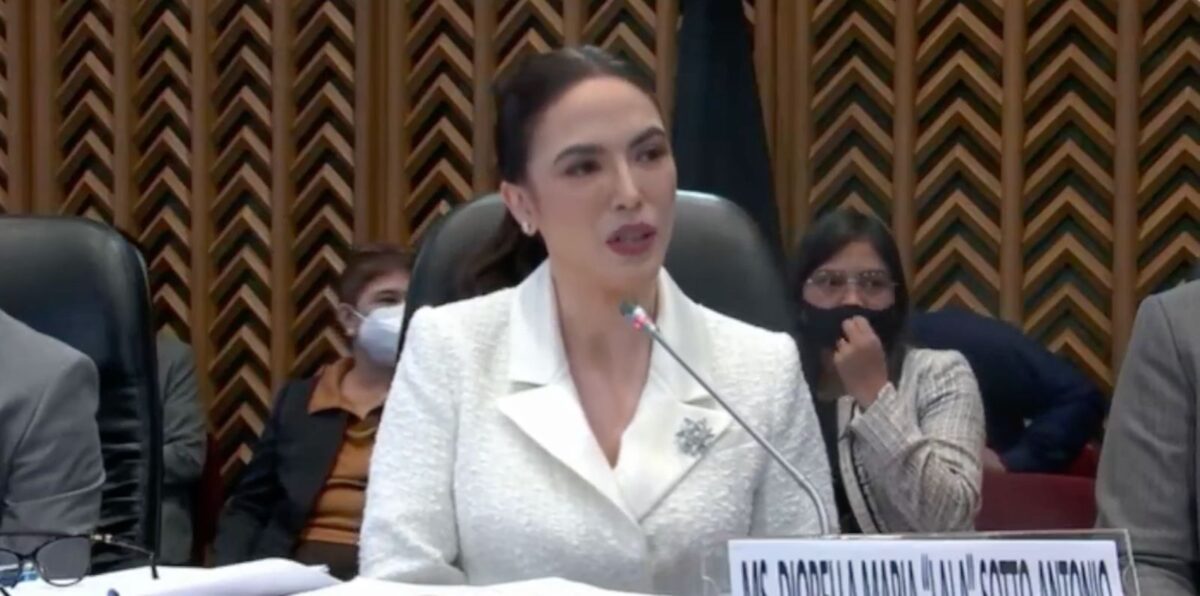MTRCB says hands tied on Vivamax, other online-generated content

MTRCB chairperson Lala Sotto-Antonio faces the Senate during budget deliberations. Screengrab from YouTube / Senate of the Philippines
The regulation of social media or online-generated content from streaming platforms such as Netflix and Vivamax is “humanly impossible” and not part of the Movie and Television Review and Classification Board’s (MTRCB) mandate, according to its chairman, Lala Sotto-Antonio.
At the Senate subcommittee hearing on the board’s 2025 budget proposal, Sotto-Antonio was asked by Senate President Pro Tempore Jinggoy Estrada if it is possible to regulate supposedly X-rated content streamed on various online applications, but the MTRCB chair said this was not within the scope of the agency.
“Truthfully, it’s impossible to regulate all these online curated content platform services. We cannot review and classify every material before it is exhibited on the screens. First, it is not within our mandate, it is not within our purview, and it is humanly impossible,” the MTRCB chief explained.
“There are only 31 board members, and there are thousands, even millions of materials to be reviewed if we will be reviewing online streaming. And the board is not capable of doing so,” she added.
However, Sotto-Antonio said they are proposing to establish a feedback mechanism from the Online Curated Content (OCCs) to address the concerns or complaints related to various materials on online platforms.
“I think it is of utmost importance for the MTRCB as a regulator, that we establish a strong feedback mechanism with a focal contact point from the OCCs. Then it is going to be easy for us to address the concerns and complaints from the general public, especially the parents who continue to be very bothered about the content their children are exposed to,” she explained.
“But we need an assurance from the OCCs, from these providers, that they would provide us with responsiveness and accountability to their content,” she added.
Likewise, MTRCB executive director Roberto Diciembre said online contents are not covered by the agency’s jurisdiction, pointing out that the internet was not yet established during the crafting of Presidential Decree No. 1986.
“Ang ginagawa ni chair Lala is talking with… having meaningful dialogues with these online or mga streaming providers even socmed platforms, kasi we receive so many complaints sa Facebook sa Netflix sa lahat ng mga yan,” Diciember revealed.
(Chair Lala is having meaningful dialogues with these online or mga streaming providers even social media platforms, since we receive so many complaints on Facebook or Netflix and other platforms.)
“Even Vivamax?” Estrada asked, to which Diciembre said: “Yes.”
According to Sotto-Antonio, the MTRCB is already in talks with the owners of Vivamax, who have been trying their best to cooperate with the board.
“They have created another online streaming app apart from Vivamax, which is VivaOne. So we appreciate the efforts, but unfortunately, the content still bothers the general public,” she added.
Push for MTRCB charter amendment
For his part, Estrada said Senator Robinhood Padilla — who heads the committee on public information and mass media — is set to sponsor a committee report amending the MTRCB charter, which covers the regulation of digital content.
“That will really be a big help. Talagang pwede niyo na iregulate itong… lalo na itong Vivamax. I haven’t watched any movie of Vivamax, but according to those who are always watching, medyo may pagkalaswa ng konti,” he said.
MTRCB was created in October 1985 by virtue of Presidential Decree (PD) 1986, at a time when the internet streaming has not yet existed.
Amendments to the MTRCB charter surfaced last March when Padilla extended support to the body’s “Responsableng Panonood” program amid the rapid growth of online streaming apps.
Sotto-Antonio had said that MTRCB has been partnering with subscription video-on-demand (SVOD) companies in order to get their cooperation “for the right content to reach the correct age group across platforms such as smart TV, web-based and mobile devices.”